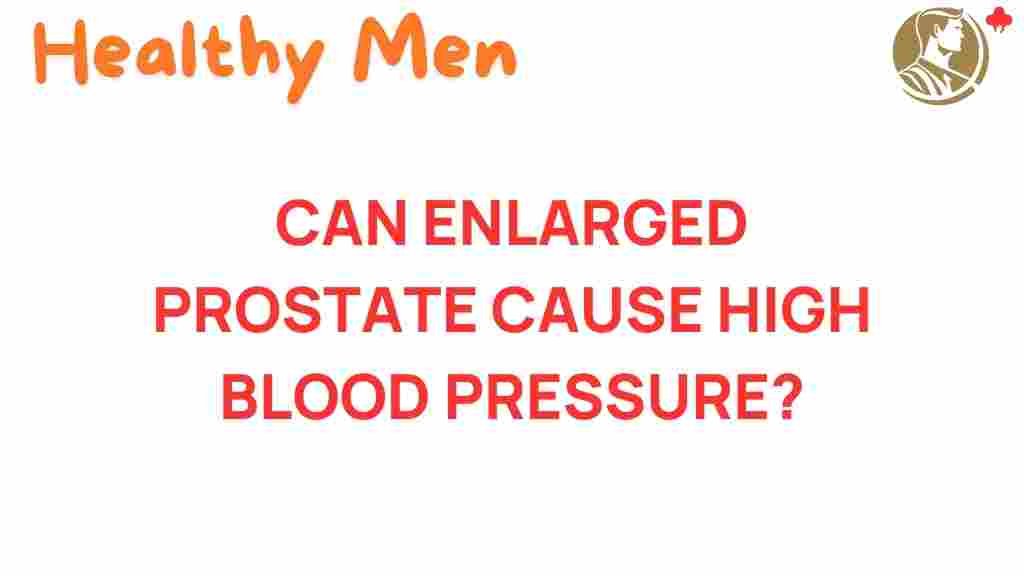The Surprising Link Between Enlarged Prostate and High Blood Pressure
When it comes to men’s health, two conditions often discussed are enlarged prostate (benign prostatic hyperplasia or BPH) and high blood pressure (hypertension). While these health issues may seem unrelated, emerging research suggests there is a surprising connection between them. This article will delve into the relationship between enlarged prostate and high blood pressure, exploring the health risks associated with both conditions, their impact on urinary issues and cardiovascular health, and tips for maintaining overall wellness.
Understanding Enlarged Prostate and High Blood Pressure
Before exploring their interconnections, it’s important to understand both conditions individually.
What is an Enlarged Prostate?
An enlarged prostate is a common condition in older men, characterized by an increase in the size of the prostate gland. This can lead to various urinary issues, including:
- Frequent urination, especially at night (nocturia)
- Difficulty starting urination
- Weak urine stream
- Inability to fully empty the bladder
While BPH is not cancerous, it can significantly affect quality of life and lead to complications if left untreated.
What is High Blood Pressure?
High blood pressure, or hypertension, is a chronic condition that can lead to severe health risks, including heart disease, stroke, and kidney damage. Hypertension is often called a “silent killer” because it typically has no symptoms. Regular monitoring is essential for early detection and management.
The Link Between Enlarged Prostate and High Blood Pressure
Research has indicated that there is a correlation between enlarged prostate and high blood pressure. Here are some of the surprising connections:
Both conditions share several risk factors, including:
- Age: Both BPH and hypertension are more common in older men.
- Obesity: Increased body weight is a significant risk factor for both conditions.
- Physical Inactivity: A sedentary lifestyle can contribute to the development of both enlarged prostate and high blood pressure.
- Diet: High sodium intake and low consumption of fruits and vegetables can exacerbate both conditions.
2. Hormonal Changes
As men age, hormonal changes occur that can affect both the prostate and blood pressure regulation. For instance, increased levels of dihydrotestosterone (DHT) are linked to prostate enlargement, while hormonal imbalances can impact vascular health and blood pressure.
3. Medications and Treatments
Some medications used to treat BPH, such as alpha-blockers, can affect blood pressure. These medications relax the muscles of the prostate and bladder neck, which can simultaneously lower blood pressure in some patients. It’s crucial to discuss these effects with a healthcare provider.
Health Risks of Coexisting Conditions
The combination of an enlarged prostate and high blood pressure can pose significant health risks:
- Increased Cardiovascular Risk: Men with high blood pressure are at a greater risk of cardiovascular diseases. The presence of BPH may exacerbate this risk due to stress and discomfort caused by urinary issues.
- Urinary Retention: Men with both conditions may experience severe urinary retention, which can lead to kidney damage and infection.
- Quality of Life: The combination of urinary issues and hypertension can decrease overall quality of life, leading to anxiety and depression.
Step-by-Step Process for Managing Enlarged Prostate and High Blood Pressure
Managing both enlarged prostate and high blood pressure involves a comprehensive approach. Here are steps you can take:
1. Regular Health Screenings
Schedule regular check-ups with your healthcare provider to monitor prostate health and blood pressure levels. Early detection is key to effective management.
2. Lifestyle Modifications
Adopt a heart-healthy lifestyle that benefits both conditions:
- Maintain a Healthy Weight: Aim for a balanced diet rich in fruits, vegetables, whole grains, and lean proteins.
- Exercise Regularly: Engage in at least 150 minutes of moderate-intensity exercise per week to improve cardiovascular health and manage weight.
- Limit Sodium Intake: Reducing sodium can help control blood pressure and may alleviate some urinary symptoms.
3. Medication Management
Work with your healthcare provider to manage medications effectively. Be open about any side effects you experience, especially concerning blood pressure and urinary function.
4. Monitor Symptoms
Keep track of your symptoms, including any changes in urination patterns or blood pressure readings. This information can help your healthcare provider adjust your treatment plan as needed.
Troubleshooting Tips for Managing Symptoms
If you’re experiencing symptoms related to either condition, consider these troubleshooting tips:
For Urinary Issues:
- Limit fluid intake in the evening to reduce nighttime urination.
- Practice pelvic floor exercises to strengthen the muscles around the bladder.
- Consider bladder training techniques to improve bladder control.
For High Blood Pressure:
- Keep a log of your blood pressure readings to identify patterns or triggers.
- Practice relaxation techniques, such as meditation or deep breathing exercises, to help manage stress.
- Avoid excessive alcohol consumption and quit smoking.
Conclusion
The connection between enlarged prostate and high blood pressure is an important consideration for men’s health. Understanding the shared risk factors and health risks associated with these conditions can empower men to take proactive steps in managing their health. Regular screenings, lifestyle modifications, and effective medication management are vital for maintaining prostate health and overall cardiovascular wellness.
For more information on managing your health and wellness, consider visiting reputable sources like the Mayo Clinic for valuable insights.
By prioritizing your health and staying informed, you can mitigate the risks associated with both enlarged prostate and high blood pressure, ensuring a healthier, more fulfilling life.
For additional resources on men’s health, you might find this link helpful.
This article is in the category Conditions and created by healthymen Team
